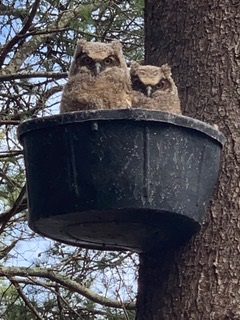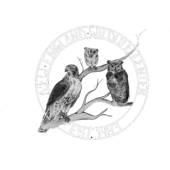
As everyone has, the Cape Wildlife Center has been severely impacted by Covid-19. We are continuing our mission to care for sick, injured, and orphaned wildlife, and had to figure out a way to do it that would benefit wildlife while keeping our staff and the public safe. Our first step was to insure the safety and continued care of the animals that we already have in our hospital. To make this possible we have staff that has agreed to shelter in place at our facility. Out of an abundance of caution we decided to furlough all 70 of our volunteers and temporarily suspend our internship program. Everyone else is working from home. Safety of staff and patients is our number one concern, and by taking these steps we have been able to keep the hospital open on a limited basis to continue serving our community.
Even though our building isn’t open for visitors, we are committed to being available to the public. We have launched a rescue service with teams working out of both our Barnstable and Weymouth locations. We are providing emergency pick-ups to patients in the wild only, to help prevent person-to-person contact. We have extended our telephone answering service, and all calls are being directly routed to our executive director. He triages the calls and sends out the rescue team if necessary. There have been a lot of wildlife calls because people are home and walking outside more. About 60% of these calls involve education on how to leave the animal in the wild if at all possible. The caller is walked through re-nesting step by step, and most have been successful.
It is spring baby season, which is making the timing of this pandemic especially challenging. Normally we would be admitting between 10-40 patients a day. We are taking as many patients as we can given our current staffing, but we are relying on public education and our network of wildlife rehabilitators now more than ever. We are focusing our efforts on rescuing animals with significant trauma and medically intensive injuries. Some of the animals we have picked up include are a fox with a leg caught in an illegal leg trap, a young fox kit with his front legs embedded with plastic 6 pack rings, an opossum hit by a car with babies in her pouch, and two hawks with bullet wounds. We are the only hope for these animals, and many more like them so we are doing everything we can to keep our services available.
In addition to being a wildlife hospital, 50% of our efforts include education and outreach. Every service we provide to an animal we see as an educational opportunity. In normal times we would have school children in the building, or go into their classrooms, have high school, college and veterinary interns and be giving talks to the public. We have creatively changed the way we are delivering our education. The staff has been using Facebook Live to post videos showing animal care. These show surgeries, treatments, physical exams and diagnostic tools including radiographs. Check out our Facebook page for videos on a Red Tailed Hawk, Virginia Opossum, Herring Gull and a DiamondBack Terrapin. They are very interesting and informative and we are using them in our classroom program now called “Science through Social Distancing”.
We also switched the Wildlife Rehabilitator Course to an on- line course, and held an all -day webinar training for animal control officers throughout Massachusetts. We are planning a virtual open house tour in the near future to take everyone behind the scenes.
Our staff will continue to provide wildlife care with as few interruptions as possible. The result of not being directly with the public, and not having people in our building has impacted us financially. As a donation-funded non-profit, we rely on the donations we receive from the public, and many of those come in when an animal is dropped off. Funding to keep our programs running is crucial.
You can help us, and wildlife by doing the following:
Call the center 508 362 0111 if you find any orphaned or injured wildlife, for help with the disposition. If we do not answer, please leave a message, you will get a call back.
Follow us on Facebook, Instagram and our website. Capecodwildlifecenter.org
This is where you will see what we are doing and the difference we are making.
Talk about what you have learned from our virtual posts to others and spread the information
Donate to us if you can. We are aware that these are financially difficult times for many, as they are for us, and we appreciate greatly any donation.
Join Cape Wildlife Center 100, a group of donors who give quarterly and together make a tremendous impact. Learn about this on our Website.
You can donate directly at our Website. Capecodwildlifecenter.org or mail a check to Cape Wildlife Center 4011 Main Street Barnstable, MA. 02630
Please stay safe and healthy and we look forward to when we can see you all face to face again.
Caryn Ritchie is the volunteer coordinator for the Cape Wildlife Center and holds both a Massachusetts rehabilitator’s license and a federal permit to rehabilitate migratory birds.

Recent Comments